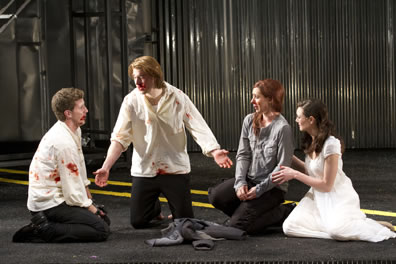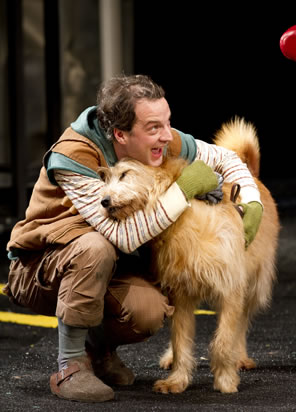Two Gentlemen of Verona
Taking a Serious Stab at This Comedy
With Youthful Aggression and a Great Crab
Shakespeare Theatre Company, Lansburgh Theatre, Washington, D.C.,
Wednesday, December 7, 2011, D–113&114 (center left stalls)
Directed by PJ Paparelli
This play likely would never be performed if it didn’t have William Shakespeare’s name attached. The few times it is staged, directors tend to turn it into a farce or musical to make up for the glaring holes in the story and the incredulous ending. PJ Paparelli, however, sees much merit in the play as it is, and his staging aims to return Two Gentlemen of Verona to a status worthy of Shakespeare’s credit line.

The lovers reconcile after the big brawl in the Shakespeare Theatre Company's production of The Two Gentlemen of Verona. From left, Nick Dillenburg as Proteus, Andrew Veenstra as Valentine, Miriam Silverman as Julia and Natalie Mitchell as Silvia. Photo by Scott Suchman, Shakespeare Theatre Company.
Paparelli’s production set out before Bardologists a strong, if not convincing, argument for the play’s merits. More important, the production achieved its primary goal of providing an entertaining and enticing night of theater. Along the way, the show gave us the most perfect Shakespearean performance ever (keeping in mind that perfection is in the eye of the beholder, a major theme of Two Gentlemen of Verona).
Many believe this was Shakespeare’s first play, based on its quality. I agree that it is poorly written but consider the “therefore first” logic careless presumption. I can think of few writers, directors, or musicians who continuously improved over the course of their artistic journeys. By that thinking, Hamlet should have been the last play Shakespeare wrote. I side with the opinion that Taming of the Shrew and the first two Henry VI plays—each with stock characters speaking serviceable but simplistically derived verse—were his first outings. However, Two Gentlemen of Verona, despite its hole-ridden plot and pedestrian verse, seems to be Shakespeare consciously setting out on an artistic journey that would hand us many wonderful experiences before he finally packed up his pen. Having learned his craft by imitating others (and perhaps having already improved his skills in drawing characters and writing verse with Henry VI, Part Three and Richard III), Shakespeare pushed his creative envelope with Two Gents.
By playing Two Gents straight, Paparelli’s production couldn't gloss over how ewww-worthy much of it is; but Shakespeare’s failures possibly taught him how to succeed in subsequent efforts. The romantic comedy plot he fumbled in Two Gents he would take to new heights with Midsummer Night's Dream, As You Like It, Much Ado About Nothing, and Twelfth Night. The painfully plodding imagery arcs he attempted in Two Gents he would perfect to an unequaled level in almost every play that came after. Many Two Gents characters prove to be prototypes for later plays. Valentine is further fleshed out as Berowne and Benedick. Proteus (with a bit of influence from Richard III) is the precursor of Iago and Edmund. Launce becomes Bottom and Dogberry, and Speed becomes Puck and Mercutio. If it achieved nothing else, Two Gentlemen of Verona deserves honor as the possible debut of the two boy actors who would enable Shakespeare to write such remarkable pairings as Rosalind and Celia, Hermia and Helena, Portia and Nerissa, Beatrice and Hero, and the crowning achievement of Viola and Olivia.
The play Paparelli especially saw as Two Gents’ progeny was Shakespeare’s other visit to fair Verona, Romeo and Juliet. Both plays center on hormonally raging youths over-infused with aggressive tendencies and under-equipped with coping skills. The director has visited this topic in previous outings: columbinus, which probed the circumstances of the Columbine High School shootings; and Shakespeare’s Romeo and Juliet at the Folger in 2005, unstinting in its portrayal of violent youths.
Paparelli is equally unstinting in that portrayal with his Two Gents. The titular characters, Valentine and Proteus, open the play at a going-away, binge-drinking soiree for Valentine that briefly includes a physical tussle between the two buddies. The play ends with an all-out brawl between them, culminating in bloodied and bruised faces. Even Julia in disguise takes a hard punch. Between these two fights the sense of young men always ready and willing to throw down permeates the whole play’s mood.
Shakespeare’s problematic ending sees Valentine saving his Sylvia from being raped by Proteus and then offering Sylvia to Proteus, only to be interrupted in the exchange by Proteus’ former love, Julia, revealing herself. Paparelli kept Shakespeare's lines but remolded the ending with Proteus attempting suicide. This surely was far from Shakespeare’s intentions, but I deem it effective, if only to misstate Valentine’s otherwise bizarre intention in the text. This alteration also turned what could have been a tritely rendered moment into a ramping up of the tension that had been coursing through the whole play.
While Proteus (Nick Dillenburg) was clearly in the wrong for betraying both his girlfriend and his buddy, every character displayed some form of self-destructive vanity. Valentine (Andrew Veenstra) combined arrogant hubris with an excessive fondness for alcohol that culminated in his banishment from Milan. That scene (with Brent Harris as the Duke) was played in public as Sylvia and other members of the court looked on to maximize Valentine’s humiliation and complete his fall. His redemption started then.
So did Sylvia’s. In Natalie Mitchell's portrayal, Sylvia lapped up being the court’s center of attention and shrewdly played to her status among men as the idealized woman, using that as a source of power to manipulate her suitors, including stringing along Thurio (Gene Gillette in a testosterone-infused performance that was more malevolent than clownish). Valentine’s banishment revealed the consequences of abusing that power, and Sylvia afterward found virtue in speaking honestly—and bitterly—to Thurio, Proteus, and even her father. Julia (Miriam Silverman) trumped up her immature longings and imposed them on her associates, turning petulantly irritable on a whim and literally self-destructive by using a blade to cut a “P” in her arm. Her self-absorption led to her foolish pursuit of Proteus in Milan, but in doing so she discovered what real heartbreak was.
Most destructive of all, of course, was Proteus. Dillenburg didn’t play him as too deeply in love with either Julia or Valentine, and as he tended to skate over emotions rather than dive into them he easily made the logical argument in the play’s two centerpiece soliloquies that cemented his betrayal. “I to myself am dearer than a friend, for love is still most precious in itself,” Proteus says in the second soliloquy, and Dillenburg shrugged as if the line’s obviousness didn’t even merit one soliloquy, let alone two. Coming face-to-face with the objects of his betrayal in the end, Proteus took the most self-destructive route of all, first with his fists and then with a pistol, and was redeemed only through the unequivocal love of Valentine, Julia, and even Sylvia.

Euan Morton as Launce and Oliver as Crab. Photo by Scott Suchman, Shakespeare Theatre Company.
In depicting this play as a coming-of-age tale and gleaning more humor in the characters' behaviors than in Shakespeare's jokes, Paparelli aimed the production at a young audience immersed in modern culture, including text messages appearing on a screen above the stage.. Designed by Walt Spangler, the setting was a vaguely European-tinged metroplex, a logo-bearing industrial-type environment that served as a parking lot hangout, a trendy nightclub, and an abandoned warehouse. Paul Spadone costumed the characters in modern dress but with vests and waistcoats for the men and formal gowns for the women that evoked the styles of Renaissance Verona. Pop music abounded: U2 hits were used in a karaoke scene and as a closing song of hope, and we entered the Milan nightlife with women pulsating to “Single Ladies (Put a Ring On It).” Indeed, Bono and Beyonce provided better poetry and catchier rhythms for this production than Shakespeare did.
In all this sound and fury and Shakespearean shortcomings shone a strong ensemble of actors led by Veenstra, who somehow made the verse poetical while still believably playing out Valentine’s turvy-topsy progression. This role, combined with his performance in The Heir Apparent earlier in this STC season, revealed Veenstra to be a young Shakespearean actor more than capable of taking his place atop any marquee. Silverman’s Julia may have been petulant to the point of irritation in her opening scenes, but in mastering the crushed emotions of the disguised boy she gave us a glimpse of Shakespeare’s nascent genius. Adam Green as Speed (Valentine’s servant) and Euan Morton as Launce (Proteus’ servant) performed the comic set pieces effectively enough to earn genuine laughs with the lines. Morton deserves extra credit; as he recounted taking leave of his family and described the odor-causing stir at the Duke’s banquet, Morton achieved a memorably lovable Launce even though he was acting with a scene-stealing sidekick, Crab the dog (Oliver).
Normally I avoid using the term “definitive” to describe a portrayal, but I have no qualms in saying Oliver turned in a definitive performance of Crab. Way back when I first started reading Shakespeare’s plays I tried to imagine the characters come to life. This was the first time I saw an exact rendering of my imagination of any character, let alone a dog. With what looks like an Irish Wolfhound’s face, a retriever’s body, a Labrador’s legs, a husky’s curling tail, and up to a dozen other breeds mosaicked in his body, Oliver capped off his appearance with one ear sticking straight up and the other bent halfway at a 90-degree angle. Paparelli could not have CGI’d a more perfect-looking Crab (so perfect I wonder if Oliver spent time in the makeup chair).
And the acting! Mostly, Crab just stands around, sits, or lies down. Oliver accomplished all that (sometimes showing much lapping interest in the floor or table on which he lay), but his Crab also responded with licks, yawns, or cocked head to lines in Launce’s soliloquies with no apparent signals from Launce. Crab even looked a bit abashed as Launce described how he had sacrificed whipping and the stocks to cover for his dog’s crimes. Crab may be a mongrel, but Oliver made him a multidimensional character showing shades of appreciation for his master.
That’s one more virtue of seeing a straight presentation of The Two Gentlemen of Verona: It is the only Shakespeare play to feature a dog in a starring role. Oliver revealed that Shakespeare not only set a standard of portrayal with many of his male and female characters, his composition of Crab also set a standard for all the Lassies, Benjis, and Uggies that have come since.
Eric Minton
January 31, 2012
Comment: e-mail editorial@shakespeareances.com.
Start a discussion in the Bardroom



 Find additional Shakespeareances
Find additional Shakespeareances